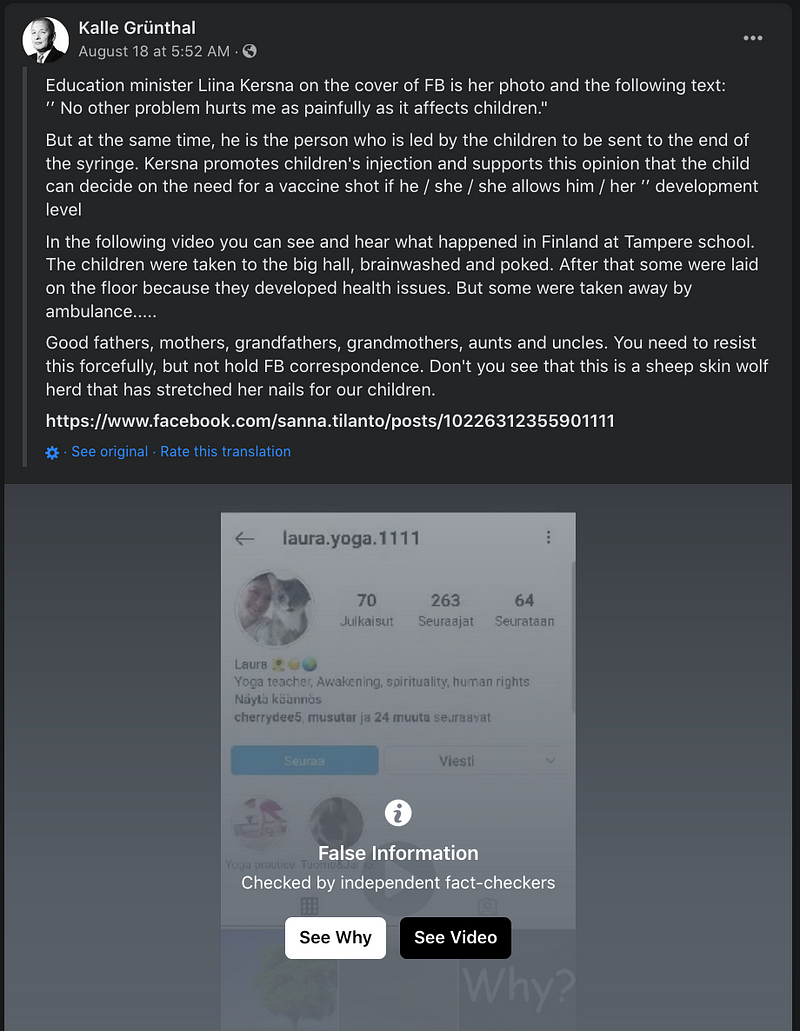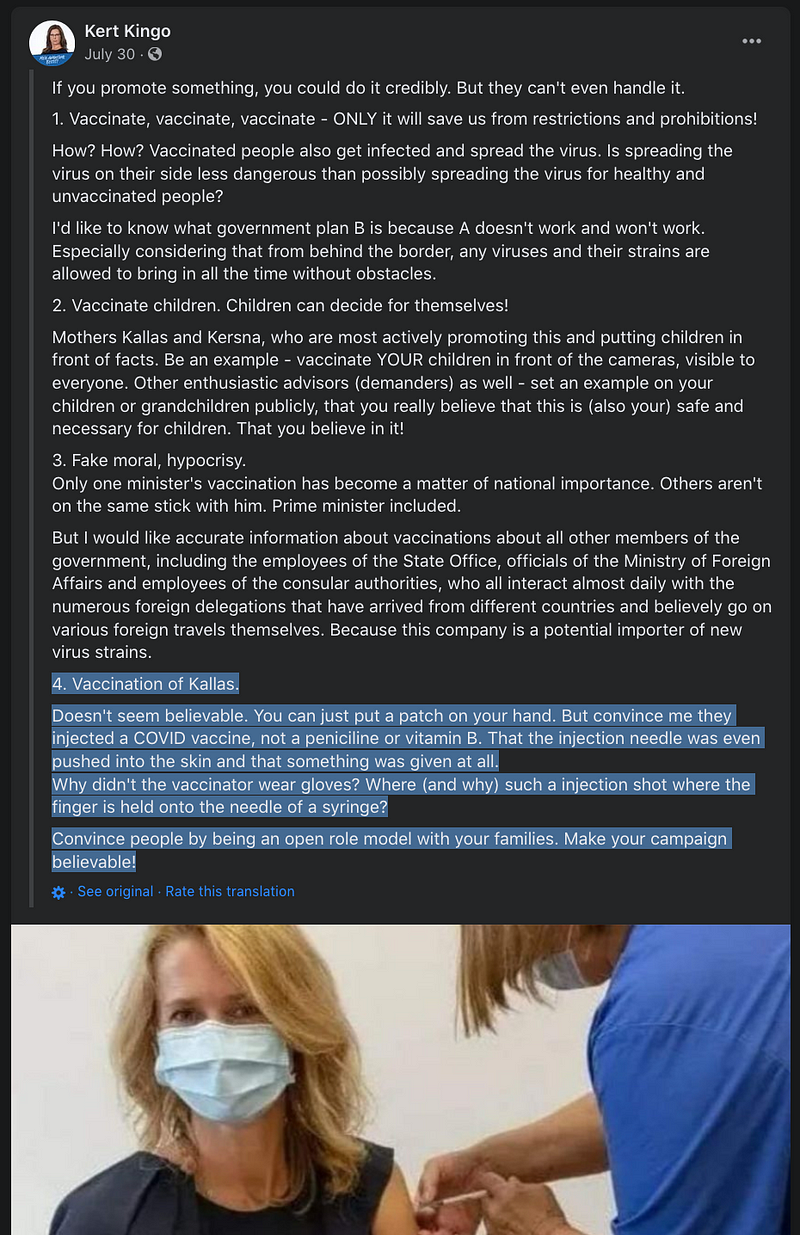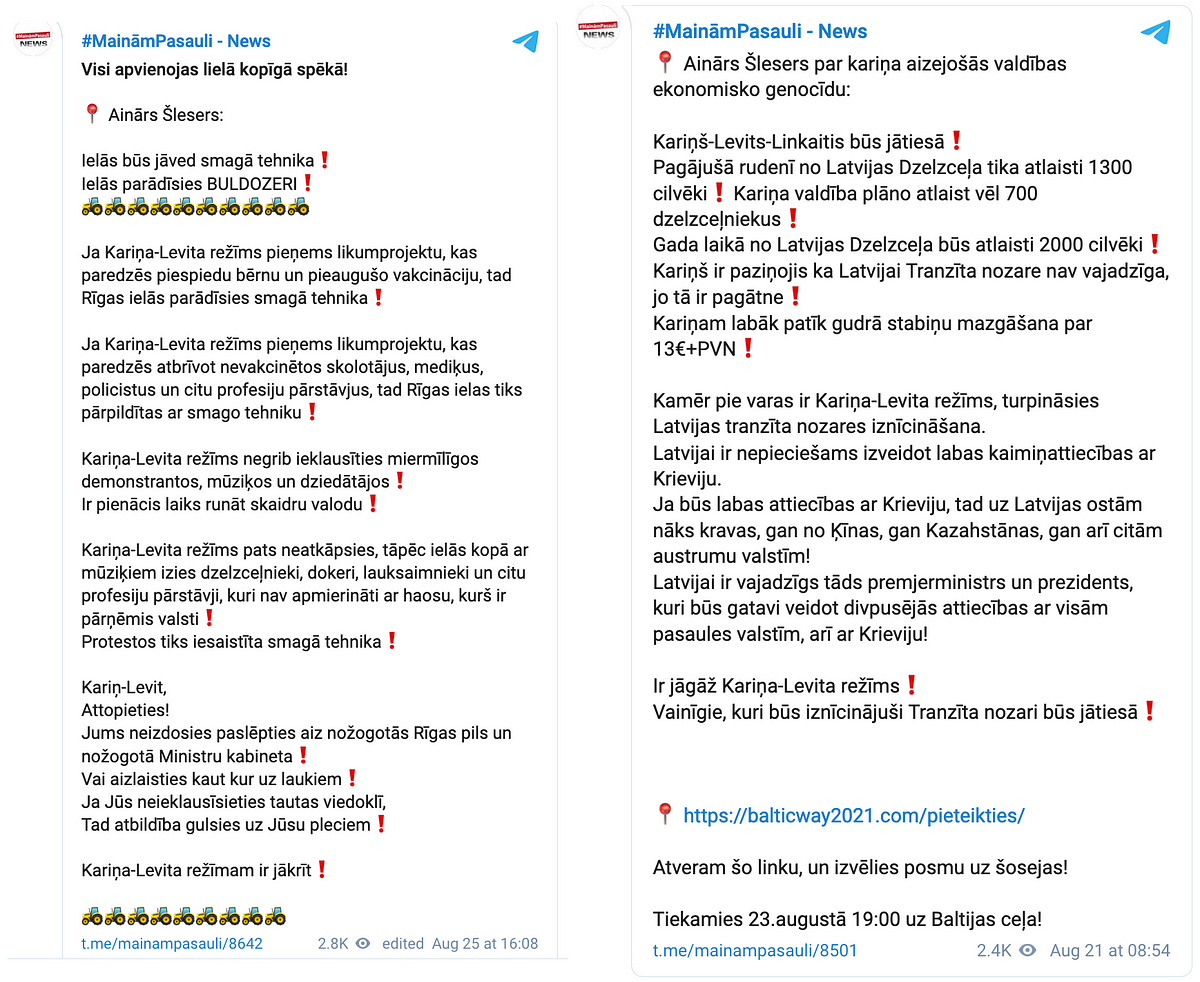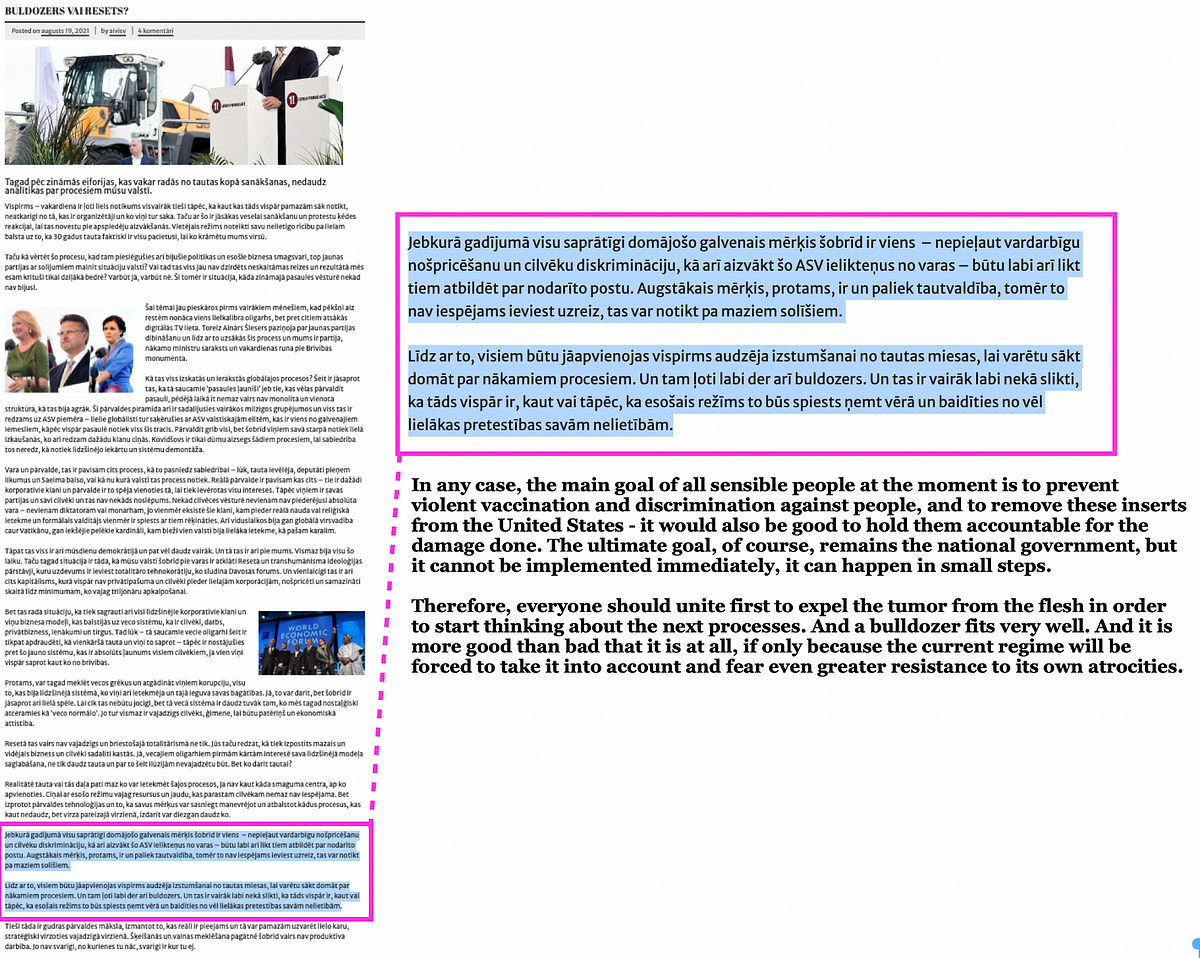Populist politicians’ strategy of undermining trust in COVID-19 vaccines undermines public health

By Nika Aleksejeva and Lukas Andriukaitis
An Estonian far-right populist party, a Latvian oligarch who faces criminal trial, and a Lithuanian populist politician with a criminal past all propagated COVID-19-related misinformation targeting each country’s ruling government. In the process, they have gained voter support during recent and upcoming national elections.
At best, populist opposition politicians in the Baltic states are using public dissatisfaction with regulations and vaccine-related policies imposed by ruling governments to prevent the spread of COVID-19. At worst, they are instilling in their supporters a fantasy about the virus not being dangerous, and therefore putting them at risk.
During the lead-ups to the October 2020 parliamentary elections in Lithuania and the August 30 presidential elections in Estonia, as well as the ongoing electioneering ahead of Latvia’s October presidential elections, far-right candidates have been deploying emotional — and largely fact-free — rhetoric designed to undermine trust in the ruling coalition. While there is no evidence as to whether these same candidates believe the misinformation they are spreading, the consequences are the same: improved electoral odds against the incumbent government and the further erosion of trust in societal institutions that are working to control the virus’s spread.
The Conservative People’s Party of Estonia
Members of The Conservative People’s Party of Estonia (EKRE) — a political party often characterized as populist, far-right, and anti-immigrant — used COVID-19 misinformation and public anger over the Estonian government’s response to the disease in order to win back influence in the Estonian Parliament. The propagation of misinformation occurred amid the positioning for the presidency, a largely ceremonial role that is elected indirectly every five years through a supermajority vote within the country’s parliament.
Mart Helme, Estonian ambassador to Russia from 1995 to 1999, founded EKRE in 2012; the party won seven seats in the Parliament in 2015. That year, however, it was not accepted into the ruling coalition following a controversial blog post in which EKRE member Jaak Madison expressed support for Nazism and authoritarian rule. In 2019, after EKRE joined the Centre Party-led government headed by Jüri Ratas as a coalition partner, Helme gave an interview to independent media outlet Ohtuleht in which he echoed Madison’s sentiment, saying that his party’s goal was to “one day become a sole government, the government of our party.”
After two years as a part of the ruling coalition from March 2019 until January 2021, however, EKRE was pushed out following the collapse of the government with Ratas’s resignation over a corruption scandal involving pandemic relief loans. Kaja Kallas, head of the Estonian Reform Party, then formed a new government in coalition with Ratas’s Centre Party, but Kallas refused to bring EKRE into the coalition “due to the parties’ different understanding of values.”
Mart Helme, however, was no longer the head of EKRE: the position fell to his son, Martin Helme, a former finance minister, in July 2020. The younger Helme is well known in Estonia for making xenophobic and anti-migrant statements. Most recently, he called for civil disobedience in response to restrictions imposed by the Kallas government around the COVID-19 pandemic.
Other members of EKRE are also using COVID-19 misinformation in their criticism of the government. For example, one of the most vocal members of EKRE amplifying COVID-19 misinformation is Kalle Grünthal.
On August 18, 2021, Grünthal shared a video to Facebook in which a woman can be seen saying that children who were allegedly vaccinated against COVID-19 in Tampere, Finland, had since developed side effects and needed hospitalization. According to a fact check by AFP news agency branch in Finland, however, the story is fabricated. While it is unclear whether he knew it to be untrue at the time of posting, Grünthal pushed the story as true while criticizing Estonian Education Minister Liina Kersna, who has spoken out in favor of children being administered COVID‑19 vaccines. Facebook later tagged the video he posted as “False information,” and at the time of writing, Grünthal had yet to delete or update the post.

EKRE member Kert Kingo, a former minister of foreign trade and information technology, is also actively expressing vaccine-skepticism in social media posts that criticize the Kallas government. Along with a false claim that vaccinated people are spreading COVID-19 at a higher rate than unvaccinated people, Kingo has also expressed disbelief that Kallas actually received the vaccine instead of “penicillin or vitamin B,” a common narrative in conspiracy theories.

There are also some vocal activists who spread COVID-19 disinformation while supporting EKRE. For example, Daniel Rüütmann, one of the lead figures of anti-lockdown protests in Estonia, sided with EKRE, sharing false claims such as alleging that 53 vaccinated people had died of COVID-19, that COVID does not exist, and that pneumonia is caused by “chemtrails” sprayed from airplanes.

Similarly, Varro Vooglaid, director of the Foundation for the Protection of Family and Tradition (SAPTK), a far-right family values organization that includes “protecting Europe’s cultural heritage” (translated from Estonian via Google Translate) among its goals, also strongly supports EKRE and echoes its messaging. On his Facebook page, he has repeated common COVID-19 misinformation narratives, including that the vaccines are “experimental;” that the vaccines cause infertility; and that Ivermectin, a drug most commonly used to treat parasitic infections in horses that is dangerous for human use, is an effective treatment of COVID-19.
A Latvian oligarch’s comeback
On August 14, 2021, Ainars Slesers, a well-known Latvian oligarch and former minister of transportation, founded a new political party called Latvija pirmajā vietā (“Latvia First”), echoing former US President Donald Trump’s “America First” slogan. Multiple individuals who joined Slesers’ new party to run as candidates are publicly known for their opposition to the ruling government in the country and use COVID-19 misinformation in particular to undermine it. More specifically, Slesers and his cohort have rejected the government’s policies aimed at controlling COVID-19 spread, including vaccinations. But 2021 is hardly Slesers’ first time in politics.
Indeed, in March 2021, Slesers announced a political comeback in March 2021, shortly after the Latvian Prosecutor’s Office accused him of fraud using public funds in the so-called “Digital Television” case. According to the charges, from 2008 to 2009, while he was minister of transportation, Slesers conspired with Andris Skele, a former prime minister and current oligarch, and seven other people to commit fraud around the technical implementation of digital television in Latvia.
In 2011, then-President Valdis Zatlers dismissed the Latvian Parliament in response to its vote that prevented the Latvian Corruption Prevention and Combating Bureau (KNAB) from searching or seizing Slesers’ house and other properties. As part of the investigation, KNAB had kept Slesers under surveillance and tapped hotel rooms where Slesers would meet with other oligarchs and influential people. In June 2017, Latvian independent analytical magazine Ir published the summary of Slesers’ conversations with others plotting how to weaken the State Prosecution Office and strengthen their political influence “just like it’s done in Russia with United Russia [Vladimir Putin’s party].”
After the extraordinary elections in 2011 resulting from Zatlers’ dismissal of parliament, however, Slesers lost public support and failed in his bid to be reelected to parliament.
Now, after the establishment of his Latvia First party, Slesers and the members of his party have chosen to attack the government’s response to COVID-19 as overly restrictive as a means of galvanizing renewed public support. For example, the party’s candidate for minister of culture, Liga Krapane, a former spokesperson for the Latvian State Audit Office, resigned after she signed onto a public letter addressing higher state officials in May 2021 that questioned the precision of COVID-19 tests and statistics, as well as the efficiency of vaccines and, therefore, restrictions on unvaccinated persons. The letter was based on many erroneous claims that have been disproven by the certified factcheckers at Re:Check, a Latvian independent nonprofit journalist organization. For instance, the letter suggested that vaccination is not recommended for pregnant women and people with chronic diseases, while the opposite is true.
The Latvia First party’s candidate for justice minister is Ilze Jurca, a former deputy chief at KNAB. On December 3, 2020, she posted a live video accusing the government of making decisions about COVID-19 prevention using incorrect data on how many people are infected with COVID-19. The factchecking team at Delfi.lv, the largest online news media outlet in Latvia, determined that her video on Facebook included “Partly False Information” because officials were not basing their decisions on the overall number of people who tested positive for COVID-19. Since that post, Jurca has actively criticized the ruling government using incorrect facts about COVID-19.
Sandris Tocs and Raimonds Rublovskis are also members of the Slesers’ new party. The DFRLab reported previously on how they used COVID-19 disinformation for political purposes in December 2020.
A few well-known activists who have spread COVID-19 disinformation since the pandemic started are also now expressing support for Slesers. For example, Janis Plavins is now promoting Slesers, but has previously expressed support for popular opposition politician Aldis Gobzems, whom the DFRLab has also covered. On his Telegram channel, “#MainamPasauli — News,” Plavins amplified Slesers’ call to overthrow the ruling government.

Aivis Vasilevskis, another well-known activist spreading conspiracy theories about COVID-19, also expressed the idea that Slesers’ political force must be used to “remove the inserts from the United States,” a reference to Latvian Prime Minister Krisjanis Karins and his dual US-Latvian citizenship.

Lithuanian opposition provokes civil unrest
In Lithuania, the most noteworthy politician seeking political gains from the ongoing COVID-19 pandemic is Viktor Uspaskich, a member of the European Parliament. Uspaskich is a Lithuanian oligarch and leads the populist Darbo Partija (“Labour Party”), which made a recent political comeback despite its sordid history. In 2006, the Lithuanian government launched a criminal investigation into the party’s activities and discovered signs of large financial fraud, after which Uspaskich fled to Russia. In 2013, Uspaskich was sentenced to four years in prison for fraud but managed to avoid serving time after appealing the case in court, yet the Labour Party was voted out of Lithuanian Parliament in the 2016 elections.
The Labour Party made a sudden comeback in 2020 elections, however, at the peak of coronavirus pandemic. Online, Uspaskich and official Labour Party channels quickly joined the anti-vax and coronavirus-skeptic narratives, together with harsh criticism directed at the current government. Uspaskich, who is known for practicing a healthy lifestyle, has been an active opponent of vaccines and restrictions around COVID-19, including by offering alternative ways to gain immunity to the virus. For example, Uspaskich has been vocal about the alleged benefits of forming a “natural immunity” against the virus, a part of which includes his December 2020 introduction of “energetically charged water” that supposedly protects those who imbibe it against the virus. Investigative journalists, however, found that the “energetically charged water,” which is sold at a price five times higher than regular bottled water, is produced by a company partially owned by Uspaskich’s children.

On August 10, 2021, an anti-vax protest outside the Lithuanian Parliament called for a number of changes, including calling off the COVID-19 green pass, stopping supposed discrimination against unvaccinated people, and the resignation of the government, among other populist demands. Among the organizers and participants in the protest were infamous propagandists (Antanas Kandrotas-Celofanas), at least one person convicted of spying (Algirdas Paleckis), and convicted criminals (Tadeušas Vasilevskis-Gibonas, Andrius Lobovas). The protests started peacefully but ended in violence, resulting in 16 police officers being hurt. Uspaskich was also present at the protest, where he gave a speechcalled for an end to “segregation,” an attack on measures that mandate tighter restrictions for unvaccinated individuals. The same day, investigative journalists accused Uspaskich of being the main financial supporter for the protest.
In an August 13 Labour Party statement published in response to the riot, Uspaskich denied his active involvement and denounced the violence. However, he also used the statement to spread anti-vaccine narratives. In the statement, he publicly asked Lithuania’s president, prime minister, and parliament spokesperson to stop “discriminating against the unvaccinated” and to stop the use of “experimental vaccines,” providing references to alleged scientists often quoted by the anti-vax community.
Dainius Kepenis, a member of Lithuania’s parliament, was also a part of the violent protest, where he also gave a speech criticizing the vaccine passports, anti-COVID-19 measures, and the government. Kepenis is well-known in Lithuania for his alternative medicine practices and had expressed skepticism of vaccines well before the coronavirus outbreak. For example, in 2019, Kepenis promoted sexual abstinence instead of vaccinating girls from human papillomavirus.
In 2020, Kepenis’s social media pages became a breeding ground for anti-vax conspiracies as he shared claims that COVID-19 is a global mafia project, that COVID-19 vaccines negatively impact women’s fertility, and that the vaccines contain traces of monkey cells and aborted babies, among other claims. Kepenis continues to be a harsh critic of the government’s COVID-19-related restrictions and of the government itself.

While propaganda and disinformation have historically been used by cynical politicians to score cheap political points, the COVID-19 pandemic has presented a particularly insidious opportunity, as the perpetuation of anti-vax narratives and attacks on government efforts to prevent the virus’s spread have real consequences on any ability to do so. This has been the case in the Baltic states, as elsewhere, where opportunistic politicians have taken to propagating false or misleading information around the pandemic. While it is unknown in each case whether they believe the lies they are spreading or if there is a more cynical motive, the impact is real and potentially deadly.
Nika Aleksejeva is a Research Associate, Baltics, with the Digital Forensic Research Lab.
Lukas Andriukaitis is an Associate Director with the Digital Forensic Research Lab.
Cite this case study:
Nika Aleksejeva and Lukas Andriukaitis, “Populists across the Baltic states boost COVID-19 disinformation for political gain,” Digital Forensic Research Lab (DFRLab), September 13, 2021, https://medium.com/dfrlab/populists-across-the-baltic-states-boost-covid-19-disinformation-for-political-gain-9b19ca94ad55.
Follow along for more in-depth analysis from our #DigitalSherlocks.

